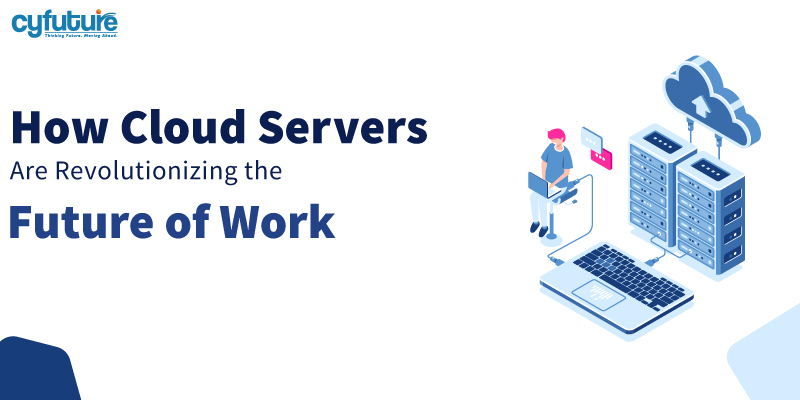-
Get Cloud GPU Server - Register Now!
Toggle navigation

In the last decade, the global workplace has undergone a seismic shift. From the rise of remote work to the acceleration of automation and digital collaboration, the traditional office environment has been completely reimagined. At the core of this transformation is one powerful technological enabler: the cloud server.
Cloud servers have not only changed how businesses store and access data but have also redefined the very framework of work itself. Organizations are no longer confined by physical boundaries, time zones, or on-premise infrastructure. The future of work is here—and it’s in the cloud.
In this blog, we explore how cloud servers are revolutionizing the way we work, collaborate, and innovate across industries.
Before diving into its transformational role, let’s first understand what a cloud server is. A cloud server is a virtual server that runs in a cloud computing environment. Unlike traditional physical servers housed in data centers, cloud servers are hosted by cloud service providers and accessed remotely via the internet.
These servers offer scalable computing resources, including processing power, storage, and memory, enabling organizations to deploy applications and manage operations without maintaining costly hardware.
Popular types of cloud server deployments include:
The flexibility, reliability, and cost-effectiveness of cloud servers make them the ideal solution for businesses of all sizes.
The future of work is being reshaped by several forces:
Each of these trends demands a high degree of agility, scalability, and security—something cloud servers provide seamlessly.
One of the most prominent shifts in the modern workplace is the rise of remote work. Organizations across the globe are increasingly adopting remote or hybrid models to increase flexibility and reduce operational costs.
Cloud servers play a pivotal role in this transition:
By enabling location-independent work, cloud servers support a more diverse and inclusive workforce while maintaining productivity.
Traditional collaboration methods—email threads and in-person meetings—are being replaced by dynamic, real-time platforms powered by cloud technology.
Cloud servers enable seamless collaboration through:
By breaking down silos and facilitating instant communication, cloud servers have made teamwork more efficient than ever.
Today’s workforce is not static. Companies often scale their teams up or down based on project demands, seasonal needs, or market fluctuations.
Cloud servers provide the flexibility to adapt to these changes:
This elasticity is crucial for startups, growing businesses, and large enterprises seeking operational agility.
With the digitalization of work comes the challenge of cybersecurity. Sensitive business data, intellectual property, and employee records need to be protected at all costs.
Cloud servers enhance security by:
Thanks to cloud servers, businesses can ensure data integrity and compliance with much greater ease than on-premise solutions.
As automation tools and AI-powered applications become essential in the modern workplace, the role of cloud servers becomes even more pronounced.
They provide the robust infrastructure needed to run complex algorithms, train machine learning models, and process big data in real-time.
Use cases include:
Without cloud servers, the computing power and scalability required for these technologies would be prohibitively expensive and complex.
As businesses expand globally, managing operations across different time zones and geographies becomes challenging. Cloud servers offer a unified platform for global connectivity.
Benefits include:
This global reach supports inclusive talent acquisition and multicultural collaboration, fueling growth and innovation.
Managing physical infrastructure is expensive, time-consuming, and often wasteful. With cloud servers, businesses can shift from capital expenditure (CapEx) to operational expenditure (OpEx), reducing financial and managerial burden.
Key advantages include:
This efficient use of resources ensures higher returns and faster time-to-market.
Sustainability is becoming a key component of business strategy. Cloud servers help reduce the carbon footprint by consolidating workloads and utilizing energy-efficient data centers.
By switching to cloud servers, organizations align themselves with eco-friendly practices while meeting their digital needs.
The only constant in the digital age is change. As technology continues to evolve, businesses need infrastructure that can evolve with it. Cloud servers are inherently adaptable, making them ideal for future-proofing work environments.
Cloud servers are not just a solution for today—they’re a foundation for the workplaces of tomorrow.
As businesses embrace digital transformation, choosing the right cloud service provider becomes crucial. Cyfuture Cloud offers robust, enterprise-grade cloud server solutions tailored for scalability, performance, and security.
Whether you’re a startup seeking agility or an enterprise pursuing innovation, Cyfuture Cloud’s cloud server offerings empower your workforce to thrive in the digital age.
The future of work is not a distant concept—it’s already here, reshaped by digital technology and driven by the growing demand for flexibility, speed, and innovation. At the center of this transformation stands the cloud server, quietly but powerfully enabling a smarter, more connected, and resilient workforce.
From remote collaboration and automation to global workforce integration and sustainability, cloud servers are no longer just infrastructure—they’re the digital backbone of the modern workplace.
As you prepare your business for what’s next, investing in the right cloud server infrastructure isn’t just a smart move—it’s a necessary one.
Embrace the future of work with Cyfuture. Let our advanced cloud server solutions be the engine that powers your business transformation.